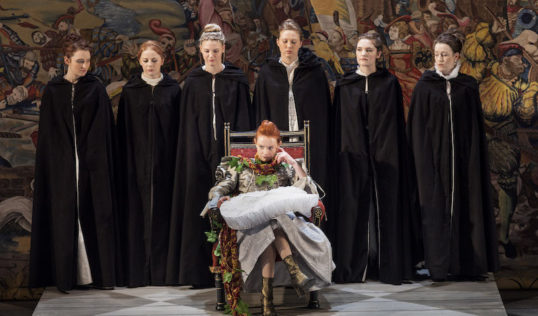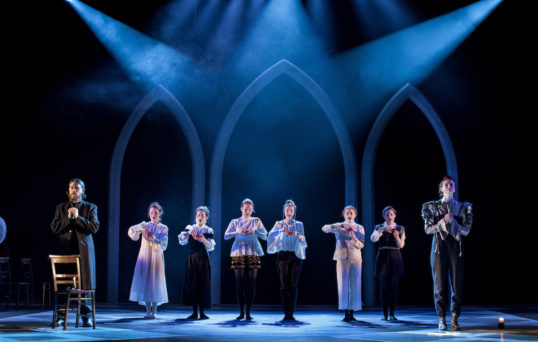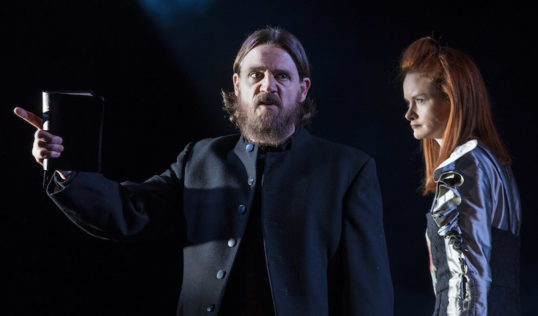Glory on Earth
★★★☆☆ Accomplished
Royal Lyceum Theatre: Sat 20 May – Sat 10 June 2017
Review by Hugh Simpson
Extreme care has been lavished on the Lyceum’s Glory on Earth. It has a clarity to its storytelling and performances, backed up by some excellent staging, but never engages the heart or mind as fully as it promises.
Linda McLean’s play, given its world premiere under the direction of Lyceum artistic director David Greig, uses the familiar story of the 16th century Scottish queen Mary Stuart. McLean does come at the story from an unusual angle, concentrating on the meetings between the young monarch, newly returned from France and still devoted to the church of Rome, and religious reformer John Knox, who regards both Catholics and female rulers with scorn.

Shannon Swan, Fiona Wood, Christina Gordon, Rona Morison, Hannah Jarrett-Scott, Kirsty McIntyre, Christie Gowans. Pic: Drew Farrell
Jamie Sives presents a Knox who is allowed more in the way of personal doubts and regrets than the austere figure of Scottish folklore. He is, however, still the unbending puritan we would expect, using his theological training to undermine Rona Morison’s more modern, more jejune Mary.
Sives and Morison handle their dialogues with aplomb; they are backed up by a chorus of Marys (six, rather than the expected four) who comment on events and play the other parts. Fiona Wood and Hannah Jarrett-Scott prove themselves particularly adaptable, but the other Marys – Christina Gordon, Christie Gowans, Kirsty Eila McIntyre and Shannon Swan – also acquit themselves admirably.
However, there is a certain lack of dramatic impact. Confrontations between two people who are never going to admit that the other has any kind of point are not likely to go very far; the monologues and depictions of Mary’s life that make up the rest of the play strive for a poetic grace and majesty that always seem just out of reach. Oddly for a play about religious zealotry, there is a certain lack of conviction that cannot all be put down to a desire for subtlety.
Devoting most of the action to less well-known parts of Mary’s life – Rizzio, Darnley and Bothwell do not appear, although of course her sticky end is discussed – is refreshing on one level, but is ultimately unsatisfactory.

Jamie Sives, Shannon Swan, Chrstie Gowans, Hannah Jarrett-Scott, Christina Gordon, Fiona Wood, Kirsty McIntyre, Rona Morison. Pic: Drew Farrell
This is doubly unfortunate when the technical side of the production is pretty much faultless. Greig’s direction is elastic enough to compensate for a play that is very much slanted to dialogue rather than the visual. He is helped greatly by Karen Tennent’s strikingly sparse set design and Simon Wilkinson’s penetrating lighting.
Michael John McCarthy’s sound design is more of a mixed blessing; it is successful at times, but the mix-and-match chronology of the accompanying musical score, so much the trend recently, is intrusive at times – notably when Mary and her retinue are throwing distinctly modern shapes to Christina and the Queens.
It is this very collision between old and new that causes the most unease throughout. Giving historical events modern relevance is all very well, but references to ‘putting Scotland in the centre of Europe’, Mary being compared to ‘Diana’, or being ‘let down by men’ all seem rather leaden-footed. Recasting Mary as a victim of sexism seems a step too far in terms of anachronism.
scripture-derived worldview
The clash between Knox, fixated on his scripture-derived worldview, and a Mary who seems more ready to compromise and tolerate, may fit into some conceptions of the hard Brexit landscape but is too easy a resolution. It is also a misreading of Mary, whose religious intransigence was surely the equal of Knox’s.
Depending on your point of view, Knox can be regarded as either a bogeyman who is responsible for everything from sectarian violence to the swings being chained up on Sunday, or as a fighter for freedom.
Conversely, Mary is either a tragic, misunderstood victim or misguided, self-indulgent and arrogant; either way, they are both forever being given more significance than they warrant. If we must have more views of history as the deeds and words of Kings, Queens and Great Men, surely they must be a little more nuanced.
The outsider’s view of Scottish history is often dominated by two over-exposed, over-glamourised, over-romanticised figures – ‘Mary Queen of Scots’ and ‘Bonnie Prince Charlie’. New depictions of either need to make a very convincing case to justify themselves. Despite its fine performances, impeccable production standards and often intriguing script, this production does not quite do that.
Running time 2 hours including one interval
Royal Lyceum Theatre, Grindlay Street EH3 9AX
Saturday 20 May – Saturday 20 June May 2017
Tues – Sat at 7.30 pm, Matinee Wed & Sat at 2.00 pm
Tickets and details at: https://lyceum.org.uk/whats-on/production/glory-on-earth
ENDS






















Comments (1)
Trackback URL | Comments RSS Feed
Sites That Link to this Post